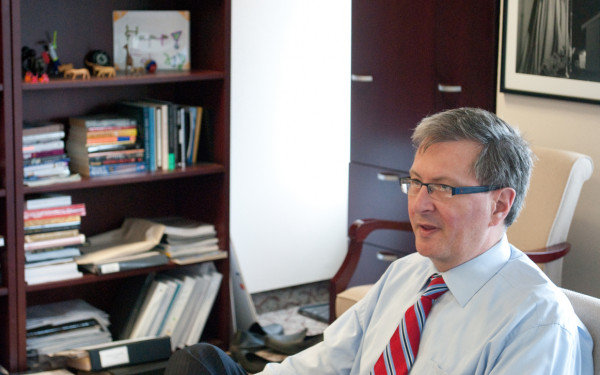Editorial: Administration Continues to Hide Behind Sexual Assault Resources
Here we go again.
We’re entering the third week since allegations of sexual misconduct in Concordia’s Creative Writing program gained widespread attention. Yet we feel the university is sweeping the issue under the rug, and is leaving the student body with unanswered questions.
To deny having any knowledge of what has been called by many the “open secret” of the English department for years now, despite the fact Concordia President Alan Shepard has taught in the department, is insulting.
Shepard is the face of our university. He constantly preaches about Concordia’s policies and its Sexual Assault Resource Centre, expressing his optimism about them. Yes, these resources are highly required in any university, but constantly praising them does not answer the burning questions about the issue at hand. This was the case during the press conference on Jan. 10.
When told that students feel as though he is failing them, the answer remains the same. Hiding behind the school’s resources is cowardice. When a student expresses concern about being in a classroom with a professor who is facing such allegations, they don’t want to hear about how great our policies are.
Several students, and former students, have come forward with stories of sexual misconduct, but Shepard’s insistence that he feels “confident that the environment that we have in our university and departments is safe,” does little to advance the conversation.
Yes, two professors involved have apparently been removed from their classes, but unless their names are revealed, that does little to reassure students—especially since the CBC reported on Thursday that another professor who has not been reassigned is facing allegations.
The questions concerning our university environment are constantly being dodged with the same answers. These stock answers we keep hearing feel like mismanaged damage control, not a genuine effort to look critically at the situation to find how we can learn and grow from it, which is what we need right now.
To make matters more concerning, not only does he talk about the “safe” environment we have at our university, he claims to be “personally committed” to building an environment free from sexual assault. He notes that since 2014, Concordia’s work on sexual assault has been “ongoing.”
Even after new policies have been put in place, not much has changed in the outcome of sexual violence cases.
Yet we can see from these allegations against professors in the English department—which had been brought to the Chair of the department in 2015, long before they became heavily publicized earlier this month—along with the 2014 cases of Mei-Ling and Cathy, the 2015 case of Felicia, and the 2016 case of Maria that their “work” has seen little progress. Even after new policies have been put in practice, not much has changed in the outcome of sexual violence cases.
Cathy, Maria and Felicia have all since brought their cases to the Quebec Human Rights Commission. When asked about those cases, Shepard said he was not aware of them. Needless to say, for Shepard to deny any knowledge of these offences is very difficult to believe.
The fact that these offences continue to happen under Concordia’s roof, and right under the administration’s noses, further points to the fact that the university’s environment is unsafe. And It will take more that new policies to mend those wounds.
Shepard announced at the last senate meeting on Friday that a conflict of interest policy will be released this week detailing how student-professor romantic relationships should be handled. It will state that any professor who is in a relationship with a student must disclose it, and cannot have any professional associations with that student.
Emma Healey’s 2014 article published in The Hairpin details a consensual relationship with a Concordia professor wherein that professor abused of his authority over her as a student. The new conflict of interest policy can do little to stop such relationships, as it relies on professors to come forward and disclose them, which many professors might not be so eager to do. Furthermore, what about non consensual interactions?
Shepard also finally apologized on behalf of Concordia at the meeting. It’s just a shame so few students were present to hear it. For once, we want to see the administration abandon the script and start engaging in those conversations the student body wants to have.




1_600_375_90_s_c1.jpg)

WEB_600_375_90_s_c1.jpg)
_600_375_90_s_c1.jpg)